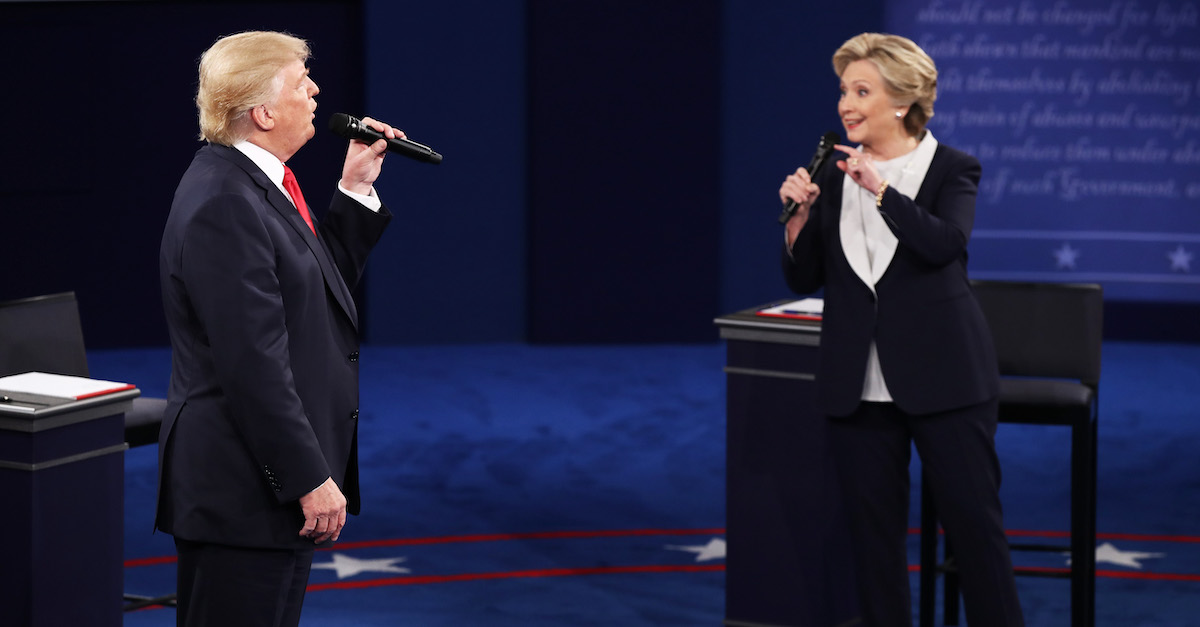
Donald Trump and Hillary Clinton debated at Washington University on October 9, 2016 in St Louis. (Photo by Win McNamee/Getty Images.)
A federal judge in the Southern District of Florida on Monday agreed to redact a bevy of subpoenas and other material filed by attorneys for Donald Trump in a sprawling lawsuit against Hillary Clinton and a lengthy list of his other perceived enemies — documents that purported to reveal the personal home addresses of many of the defendants in the case.
Attorneys for the U.S. government late Friday filed court papers in an effort to restrict the addresses of federal agents from appearing in the record. Judge Donald M. Middlebrooks, the Bill Clinton appointee assigned to the case, agreed that the “security threats cited by the United States” in a Friday motion were valid and ordered certain documents to be stricken and removed from the record by the Clerk of Court’s office. Trump’s attorneys were also ordered to re-file “redacted copies” of certain docket entries.
Prosecutors were quick to criticize the way Trump’s attorney filed the paperwork and argued that Trump’s attorney(s) failed to heed their informal warnings that revealing the addresses could be problematic.
“The United States of America—by and through the undersigned counsel and pursuant to Rule 5.2(e) of the Federal Rules of Civil Procedure—hereby moves for an order redacting, from the public record, the addresses of the former Federal Bureau of Investigation (FBI) employees named as defendants in this action,” the Friday request states.
Just some of the named defendants in the 108-page civil lawsuit, which was filed Thursday in the Southern District of Florida, include the Democratic National Committee, Democratic Party law firm Perkins Coie, that firm’s indicted former partner Michael Sussmann, Democratic Rep. Debbie Wasserman Schultz of Florida, Fusion GPS, Christopher Steele, former FBI Director James Comey, former FBI agent Peter Strzok, former FBI attorneys Lisa Page and Kevin Clinesmith, and former deputy FBI director Andrew McCabe. Also sued were several “John Does” and unknown corporations.
The attorneys for the government wrote that Trump’s attorneys revealed the addresses of some of the named defendants by filing publicly available summonses. Those documents, which were fully public without any restriction as of Saturday, Sunday, and Monday mornings, contained what were purported to be precise street addresses for some of the defendants.
Per the government’s filing:
The relevant copies of the summonses filed in the public record include the addresses of the following former FBI employees: James Comey, Andrew McCabe, Peter Strzok, Lisa Page, and Kevin Clinesmith. The addresses of the former FBI employees are not relevant to the current litigation. Moreover, the named former FBI employees include former law enforcement officers and disclosure of their personal information may lead to them being harassed, threatened, or otherwise having their safety jeopardized. In this regard, these former FBI employees have received death threats in the past. The addresses should be redacted.
The government’s attorneys said Trump’s attorney discussed the concerns with them but refused to act:
Pursuant to Local Rule 7.1(a)(3), the undersigned called Plaintiff’s counsel to inquire as to Plaintiff’s position as to the relief sought herein. Undersigned counsel was instructed to send an email with the request. Undersigned counsel sent the requested email, and Plaintiff’s counsel has not yet responded to the email inquiry. In light of the sensitive nature of the information needing to be redacted, the United States files this motion as early as possible in an abundance of caution.
Here’s the legal rationale for the government’s request:
Rule 5.2 expressly requires the exclusion of information enumerated in section (a) of that Rule. Fed.R.Civ.P. 5.2(a). In addition, section (e) allows that “the court may by order in a case [] require redaction of additional information” when “good cause” is shown. Fed.R.Civ.P. 5.2(e). Here, good cause is shown. The information sought to be redacted—the addresses of former FBI employees—has no relevance to the current litigation, and as explained above, the disclosure of that information may lead to harassment, threats, or endangerment of these individuals. Federal law recognizes the need to protect such information. See, e.g., 18 U.S.C. § 119 (providing protections for the home addresses of any officer or employee of the United States); 5 U.S.C. § 552(b)(7)(C) (precluding from production under the Freedom of Information Act “information compiled for law enforcement purposes” that “could reasonably be expected to constitute an unwarranted invasion of personal privacy”); see also Fla. Stat. § 119.071(4)(d) (providing an exception to the inclusion in public disclosures the “home addresses . . . of active or former sworn law enforcement personnel”).
The relevant documents have been sealed and/or stricken from a public federal court database as of the time of this report Monday afternoon.
The underlying case alleges 16 separate causes of action, including civil violations of federal RICO statutes, injurious falsehood, theft of trade secrets, and computer fraud and abuse.
Read the judge’s order and the original government request for relief below. The latter document was signed by Anthony Erickson-Pogorzelski, an assistant U.S. attorney.
Have a tip we should know? [email protected]